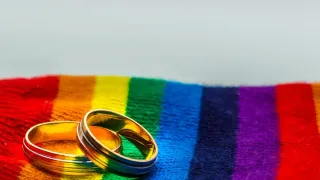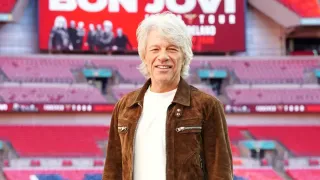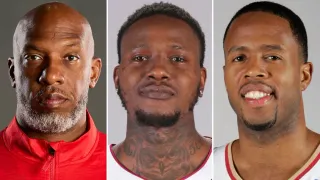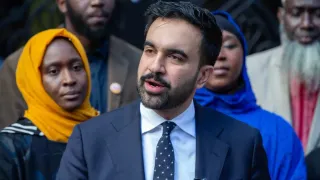May 28, 2014
Photo-Journalist Vincent Cianni's Intimate Portraits of Gays in the Military
Lewis Whittington READ TIME: 5 MIN.
"It was the one time in my life that I thought about suicide."
"Three weeks left...when they discharged me. (under Don't Ask, Don't Tell)"
"You know what breaks up unit cohesion, you know what disrupts morale, is a witch hunt."
'Nothing was ever done to the guys who did it... because they beat up a bunch of faggots, so who cared. So that's what started me coming out."
These are quotes from gay US soldiers that describe some of the harsh realities of serving under the years of codified homophobia in the US military. Their stories and portraits are now a part of a permanent collection compiled by noted photo-journalist Vince Cianni in his book "Gays in the Military" being released by Daylight Books.
Five-year mission
Earlier this spring Cianni had preview copies for display at a trade Photo Book Fair in an art gallery of the Crane Building in Philadelphia. The subject and circumstances of Cianni's book has already created buzz including articles in the New York Times, Slate and The Huffington Post. The book is already set for a second printing because pre-orders for the first printing are sold out.
What started out as a much smaller project turned into a five-year mission for the photographer. "It didn't really start as a book, it started as just a photography project in 2009," Cianni recalled. "I was working in my studio and listening to NPR, (where I heard) an interview with a mother whose son had just been discharged under DADT while serving in Iraq. The way she spoke was so powerful and touched me on a personal and emotional level. At the same time I had been tangentially involved with the repeal movement."
Most of soldiers Cianni photographed served during the 18 years of DADT policies in Iraq and Afghanistan, but some came from the Vietnam era, others as far back as WWII. The service members tell stories of dignity, courage, patriotism and pride that was often met with sanctioned oppression, violence, harassment and intolerance.
Different, but the same
Cianni photographed, interviewed and recorded over 100 veterans and active duty personnel as part of a larger exhibit and archive at Duke University. He did so before and after DADT was repealed in 2012 by the Obama administration.
"As a gay man, they were like me, but so different. I grew up in the 70s and I was demonstrating against Vietnam and was always involved with peace-keeping issues. So I never thought of the military was something that I connected with," Cianni admitted.
Cianni had a broad idea about photographing soldiers, but it wasn't until he read Nathaniel Frank's book "Unfriendly Fire" about the Draconian policies against gays, that he found the focus for "what I thought the project should be." Initially, he was concerned about whether he could gain their trust for the project, but eventually people were contacting him wanting to tell their stories.
"I thought in terms of giving voice to people who needed to have a voice," he said. "A lot of veterans jumped on the opportunity to participate in this project. They wanted to give validity to their service and rightly wanted acknowledgement. In many cases their service was wiped out when they were discharged. In some cases their physical records were destroyed by the military, they expunged everything about their service and erased their years in the service," he explained. "There was a veil of secrecy; and a whole euphemistic vocabulary. In the 60s and 70s was when a lot of physical and sexual violence occurred." Some of the incidents are recounted in the book.
Getting the trust
To get the trust from his subjects before he took the photos, Cianni conducted intimate interviews, sometimes taking hours, where they addressed personal and often painful periods of their lives. He traveled all over the US for these interview/photo sessions, which often took considerable time for Cianni "to make a personal connection with them."
In his interviews, he asked when they first realized they had same-sex attraction. "I started by asking about their childhoods - religious, cultural and social influences, when they first recognized they had same sex attractions, when they acknowledged their sexuality and if they identified before or after they went into the military," he said.
"The photographs were made after the interviews were done. That was important because I was walking in as a stranger and have them talk about very private and difficult memories, sometimes. I had to be a steward to their emotions and experiences."
Settings for the photographs were also important.
"Photographing them in their homes goes to the fact that this is a private issue. The bedroom was very symbolic of what privacy means (so a lot were shot in bedrooms). I thought their environments were able to describe who they are as individuals, separate from their career."
A permanent record
Now that the repeal has, for all intents and purposes, succeeded, those who, like Senator John McCain, predicted that changing the policy would cause chaos and worse, and others who sought to keep gays invisible in the military, now are silent on the matter.
All of the more reason these stories need to be told.
"This is more than art portraiture, it is a permanent record and historical testimony of soldiers who can now speak about the injustices GLBTQ people faced as they fought for the ideals of freedom in the US armed forces," Cianni observes.
The portraits in the book are designed to represent a "diversity of rank" that reflected the diversity of America, as well as the more wide-reaching issue of equality.
"I thought it was so interesting because it opened my eyes that this was more than a civil-rights issue and human rights issue than anything else. I came to the understanding that everyone has the right to serve their country the way they feel is right for them."
For information about the book and exhibit go to www.vincentcianni.com and www.DaylightBooks.org






